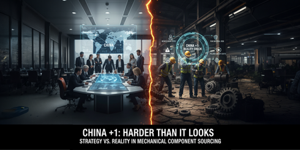Analyzing How the New Tariff Act Will Influence Manufacturing
This past week President Joe Biden announced that he is issuing out an increase on tariffs under Section 301 of the Trade Act of 1974. Section 301 of the Trade Act of 1974 is a significant piece of U.S. trade legislation. It grants the President the authority to enforce trade agreements, resolve trade disputes, and open foreign markets to U.S. goods and services. It’s particularly known for allowing the U.S. to impose trade sanctions on foreign countries that are deemed to be engaging in unfair trade practices.
The motive behind these newly enforced tariffs is to bring production and work back to America and to reduce China’s knowledge of the American public. The following section explores the details surrounding these tariffs, an overview of what this means for businesses, and how MES is staying up to date on the matter.
The Main Tariffs
Here is a highlighted bullet list of the new tariffs enforced by President Biden:
- Chinese EVs: Tariffs on Chinese electric vehicles (EVs) will rise to 100%, quadrupling from the current 25%.
- Solar Cells: The tariff on solar cell imports from China will double to 50%.
- Steel and Aluminum: Tariff rates on certain steel and aluminum products will more than triple to 25%, up from 7.5% or less.
- Medical Supplies: Tariffs on Chinese medical supplies, batteries, critical minerals, and ship-to-shore cranes are also increasing.
- Semiconductors: Tariffs on Chinese semiconductors are set to increase from 25% to 50%.
These measures are part of a broader strategy to protect U.S. industries and workers from unfair trade practices and to encourage domestic production in strategic sectors. Although these tariffs seem alarming, there are a few points MES would like to make to provide some clarity.
Let’s Clarify
First, it is important to note that 2024 is an election year, and at the time of this announcement made by President Biden American’s are only 6 months away from voting season. It typically takes anywhere from 1-3 years to enforce a new tariff. Hence, these new tariffs may or may not come to fruition based on who is elected to office fall of this year.
Secondly, tariffs issued on specific raw materials were not discussed within his address. Instead, a blanket statement was made encompassing all types of steel and aluminum. According to The White House’s latest release on the matter, this is because American made steel is high quality and has low emissions rates. In contrast, it is stated that China offers, “U.S. products (an) undercut by artificially low-priced Chinese alternatives produced with higher emissions.” Again, this shows that Biden’s reasoning behind the tariff on raw materials is not only to bring manufacturing back to North America, but to also promote globally conscious manufacturing protocols. This shows the reasoning behind the President’s decision and clarifies that it is still unknown which specific raw materials will be impacted by these tariffs.
What Does This Mean for MES Customers?
There is still quite a bit of ambiguity surrounding the latest addressment made by President Biden. Two of which were discussed in the previous section pertaining to whether these tariffs will stay in effect after the upcoming election, and whether these new tariffs will impact MES customers.
At MES Inc. we service industries such as the automotive industry, electrical industry, and energy industry. Many of the products we assist in producing include cold plates, die castings, and more. All of which may or may not be impacted by this latest addressment. Although there are still a few unknowns pertaining to Biden’s address, one thing is certain. MES Inc. will continue to monitor, update, and inform their customers to ensure they are receiving the highest quality of materials and relationship management between them and their suppliers.




